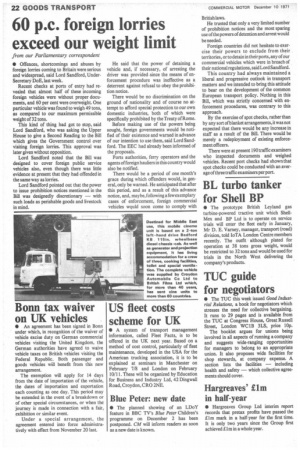60 p.c. foreign lorries exceed our weight limit
Page 24

If you've noticed an error in this article please click here to report it so we can fix it.
from our Parliamentary correspondent
• Offences, shortcomings and abuses by foreign lorries coming to Britain were serious and widespread, said Lord Sandford, UnderSecretary DoE, last week.
Recent checks at ports of entry had revealed that almost half of these incoming foreign vehicles were without proper documents, and 60 per cent were overweight. One particular vehicle was found to weigh 49 tons, as compared to our maximum permissible weight of 32 tons.
This kind of thing had got to stop, said Lord Sandford, who was asking the Upper House to give a Second Reading to the Bill which gives the Government control over visiting foreign lorries. This approval was later given without opposition.
Lord Sandford noted that the Bill was designed to cover foreign public service vehicles also, even though there was little evidence at present that they had offended in the same way as lorries.
Lord Sandford pointed out that the power to issue prohibition notices mentioned in the Bill was designedly discretionary — with such loads as perishable goods and livestock in mind. He said that the power of detaining a vehicle and, if necessary, of arresting the driver was provided .since the means of enforcement procedure was ineffective as a deterrent against refusal to obey the prohibition notice.
There would be no discrimination on the ground of nationality and of course no attempt to afford special protection to our own domestic industries, both of which were specifically prohibited by the Treaty of Rome.
Before making use of the powers being sought, foreign governments would be notified of their existence and warned in advance of our intention to use them, said Lord Sandford. The EEC had already been informed of the proposals.
Ports authorities, ferry operators and the agents of foreign hauliers in this country would also be notified.
There would be a period of one month's grace during which offenders would, in general, only be warned. He anticipated that after this period, and as a result of this advance notice, and, maybe, following a fewexemplary cases of enforcement, foreign commercial vehicles would soon come to comply with British laws.
He trusted that only a very limited number of prohibition notices and the most sparing use of the powers of detention and arrest would be needed.
Foreign countries did not hesitate to exercise their powers to exclude from their territories, or to detain in their ports, any of our commercial vehicles which were in breach of their national regulations, said Lord Sandford.
This country had always maintained a liberal and progressive outlook in transport matters and we intended to bring this attitude to bear on the development of the common European transport policy. Nothing in this Bill, which was strictly concerned with enforcement procedures, was contrary to this approach.
By the exercise of spot checks, rather than by any sort of blanket arrangements, it was not expected that there would be any increase in staff as a result of the Bill. There would be merely a redeployment of existing enforcement officers.
There were at present 190 traffic examiners who inspected documents and weighed vehicles. Recent port checks had shown that spot checks could be conducted with an average of three traffic examiners per port.




































































































